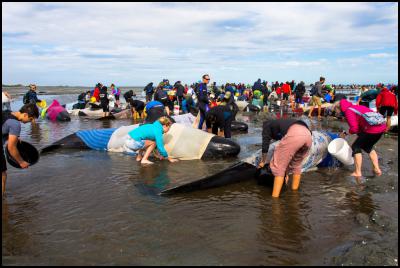Response on strandings and rescue success rates

Photo: Bare
Kiwi
Response to Recent News Articles
There is a story in the news today regarding strandings and rescue success rates in New Zealand.
Daren Grover, General Manager of Marine mammal welfare charity Project Jonah, made the following statement:
“We were approached for comment and gave interviews but sadly our thoughts and opinions were not used. There appear to be three points to the story, which we would like to address;
Survival rates: The story picks two periods to compare: 1990 – 2000 and 2000 – 2016. The data was then manipulated to exclude strandings of less than 10 whales and to exclude those strandings on Stewart and Chatham Islands. While this data shows survival rates, the Department of Conservation (DOC) have stated their data does not accurately record the number of whales that were dead upon arrival, circumstances that may have effected each event (weather, tides, accessibility) and whether necropsy results indicated physical reasons for deaths that may affect a stranded pod (i.e. disease). The later period also includes three strandings that occurred at Farewell Spit, in areas where it is too hazardous to conduct a rescue (remoteness, tidal range, quicksand) which resulted in all the whales dying or being euthanased. We hope, going forward, that recent events have highlighted a need for better data recording to aid future analysis.
Euthanasia Rates: The media analysis of the data shows euthanasia rates have substantially increased between the two periods. Our understanding is that whales were left for much longer periods of time up to the late 1990’s, in some cases delaying the eventual death of sick animals and prolonging their suffering. When asked for our opinion, Project Jonah will always take a precautionary position and only look to euthanasia as a last resort. We would call for greater understanding of the health of stranded whales in the field. Research is required to develop a triage, or evaluation system, to understand which whales might be sick and which might be healthy.
Working at Night: Working around a stranded pod of whales carries a high degree of risk. We work with people (sometimes several hundreds at a single event) to minimise their chances of being injured or injuring the whales. To carry out this operation at night, on a remote beach, carries a huge degree of danger and is a scenario that has resulted in serious injury in the past. There may be a handful of people with the skills and ability to work in such a high risk environment, however the reality is that most people would not be comfortable. While we support the current DOC position of not allowing work around stranded whales in these conditions, we acknowledge there may be rare instances where working at night might be a viable option and ask that this be assessed on a case by case basis (i.e. small number of animals, prevailing weather and sea conditions, abilities of those attending)”.
The original story can be found here: http://www.newstalkzb.co.nz/news/national/whale-stranding-survival-rates-plummet/
Ends
Project Jonah is a marine mammal welfare charity. We been helping to rescue and protect marine mammals in New Zealand since 1974.


 Gordon Campbell: On The Clash Between Auckland Airport And Air New Zealand
Gordon Campbell: On The Clash Between Auckland Airport And Air New Zealand New Zealand Defence Force: Final Court Of Inquiry Into HMNZS Manawanui Grounding And Sinking In Samoa Released
New Zealand Defence Force: Final Court Of Inquiry Into HMNZS Manawanui Grounding And Sinking In Samoa Released Organics Aotearoa NZ: Gene Tech Bill - A High-Stakes Gamble That Risks Farmers’ Livelihoods, Trade, And NZ’s Global Reputation
Organics Aotearoa NZ: Gene Tech Bill - A High-Stakes Gamble That Risks Farmers’ Livelihoods, Trade, And NZ’s Global Reputation Fire and Emergency NZ: Check Your Smoke Alarms When Clocks Go Back This Sunday
Fire and Emergency NZ: Check Your Smoke Alarms When Clocks Go Back This Sunday NZ Government: Repeal Of 7AA Puts Child Wellbeing First
NZ Government: Repeal Of 7AA Puts Child Wellbeing First NZ Government: Reducing Ambiguity About What Is Reasonably Practicable For Health And Safety Compliance
NZ Government: Reducing Ambiguity About What Is Reasonably Practicable For Health And Safety Compliance Office of the Speaker: New Zealand Parliamentarians Attend 150th IPU Assembly
Office of the Speaker: New Zealand Parliamentarians Attend 150th IPU Assembly


